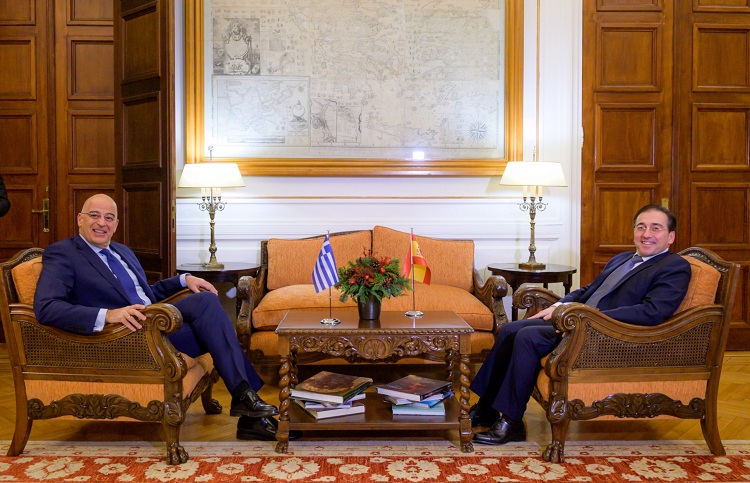The Diplomat
The misgivings raised by the recent summit between Spain and Turkey, especially Ankara’s desire to strengthen its military cooperation with Madrid, were at the center of yesterday’s visit to Athens by Foreign Minister Josá Manuel Albares.
“Since 2008, EU member states have been committed not to export military equipment that can be used against a member state, and I have been assured that Spain will always act within the framework of European decisions,” said Greek Foreign Minister Nikos Dendias during a joint statement without questions with his Spanish counterpart.
For this reason, he continued, during his meeting yesterday with Albares he conveyed Greece’s “concern” about “Spain’s possible intention to strengthen its military cooperation with Turkey”, the “only country in the world that has threatened a neighboring country with war if it exercises its rights under international law”.
For his part, José Manuel Albares limited himself to assuring journalists that “Spain is clear, it is very clear in its support for constructive dialogue between Greece and Turkey and the search for solutions in accordance with International Law”. “Greece and Spain are Mediterranean countries, European countries, allied countries, friendly countries” and, therefore, “Greece, like any other EU Member State, can count on our solidarity and with the certainty that Spain, as it always does, will act within the European agreements and common European positions,” he added.
Likewise, Albares informed that the two ministers had decided “to continue moving forward” to sign “an agreement that articulates a mechanism for regular political consultations and that structures and institutionalizes this political dialogue that Spain and Greece have on a permanent basis” and had committed to “create an economic forum for Spanish companies and Greek companies to explore together new investment opportunities in one and the other country”.
“Our companies here are strong candidates to participate in the ongoing privatization process and welcome with enthusiasm the new facilities that the Greek government is giving to foreign investment,” he continued. “We follow with particular interest the energy sector, where there are already many Spanish companies operating successfully, but we also look at air traffic management, ports, airports, water management, the railway system, aeronautical construction or shipbuilding,” he added.
Trip to Cyprus
Albares will travel today to Cyprus to meet with his Cypriot colleague, Nikos Christodoulides, with whom he already had the opportunity to meet last Thursday in Madrid on the occasion of the working visit made to Spain by the President of that country, Nikos Anastasiadis.
Greeks and Cypriots have a tense neighborly relationship with Turkey, which has recently been aggravated by gas exploration in the Eastern Mediterranean, and they consider it a kind of betrayal that Spain, a partner country in the European Union, has such close ties in military matters with a government such as that of Ankara. The Greeks would like Spain to show them firmer support, as other European countries have done, notably France, to whom the government of the conservative Kyriakos Mitsotakis awarded in September the construction of three frigates after having left out of the tender the proposal of the Spanish company Navantia.
Greece’s misgivings towards Spain were heightened by statements made by the Turkish President, Recep Tayip Erdogan, during the joint press conference with the Prime Minister, Pedro Sánchez, after the bilateral summit, in which he assured that his country is interested in acquiring a second aircraft carrier and a series of submarines for its Navy in collaboration with Navantia, which is already helping the Turks in the construction of a smaller aircraft carrier. The fear of Greece and Cyprus is that these words of Erdogan respond to the intention of Spain and Turkey to sign a Defense Treaty. Diplomatic sources assured that one of the objectives of Albares’ current tour is to deny these reports.






